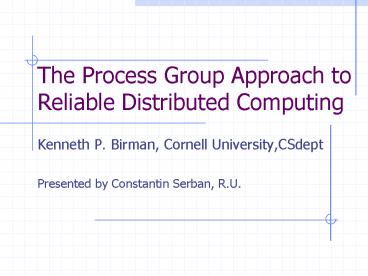The Process Group Approach to Reliable Distributed Computing - PowerPoint PPT Presentation
1 / 10
Title:
The Process Group Approach to Reliable Distributed Computing
Description:
Exactly once delivery to all or none of the subscribers ... membership list of processes, a non-responsive process is dropped from the ... – PowerPoint PPT presentation
Number of Views:81
Avg rating:3.0/5.0
Title: The Process Group Approach to Reliable Distributed Computing
1
The Process Group Approach to Reliable
Distributed Computing
- Kenneth P. Birman, Cornell University,CSdept
- Presented by Constantin Serban, R.U.
2
Assumptions
- Problem
- The traditional communication primitives are
generally reliable, but exhibit problematic
semantics during transient failures and system
configuration changes - Approach
- Use a glue software layer with predictable,
fault-tolerant, flexible, and reliable behavior - Solution
- Approach use process groups along with group
programming tools to achieve this goal
3
Paper Structure
- Desirable system example
- Process group models and requirements
- Conventional communication primitives common
pitfalls - Failure assumptions
- Group support requirements
- Close synchrony versus virtual synchrony
- The ISIS toolkit and ISIS based utilities
- Potential application of ISIS
- Conclusion
4
System example
- Brokerage and trading systems are required to
integrate large numbers of demanding
applications, timely reaction to high volumes of
information. - Goal reliability, security, flexibility,
availability, uniformity, etc - Information backplane requirements
- Publish/subscribe model
- Naming structure
- Communication interface
5
- Access restrictions
- Selective history mechanism
- Customization
- Systematic organization
- Flexible stream connection at runtime
- Hierarchical structure
- System must checkpoint, replicate on independent
machines, activate backup on failure - Solution distributed group of cooperating
programs that adapt transparent to failures and
recoveries
6
Process Group Types Anonymous
- Publish/subscriber model. Properties
- Interaction exclusive through group address (no
membership knowledge) - Exactly once delivery to all or none of the
subscribers - Message delivered in an order consistent with
casual dependencies - Logging of key events for history
7
Process Group Types Explicit group
- Members cooperate directly, explicit membership
knowledge. Additional needs - Support for group communication, addressing,
failure atomicity, message delivery ordering - Use of membership as input
- Synchronization of shared information
8
Common communication primitives
- Datagrams unreliable, message loss, duplicates,
out-of-order messages - RPCreliable, sequenced message delivery. Fuzzy
during failure unable to distinguish between
failure and delays or the precise moment of
failure - Reliable data streams outperforms RPC b/c of
pipelining. Still no guarantees regarding
consistent channel break and subsequent handling.
9
Failure Model Assumptions
- Fail-Stop model
- Processes or processors fail by halting, no
erroneous actions - Integration of transport layer (TCP-like) with
the failure detection layer - May trigger false fails on timeout
- Maintain a system membership list of processes, a
non-responsive process is dropped from the list,
and forced to shut-down or reconnect - Rejoining processes are treated like completely
new entities
10
Group Support Addressing































